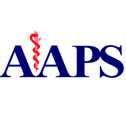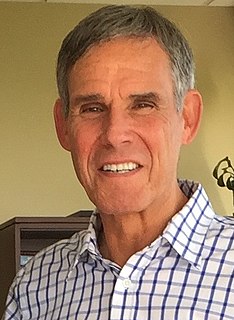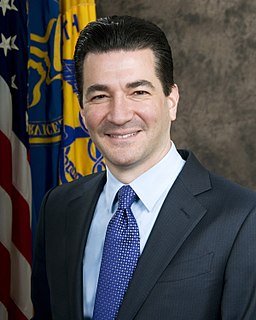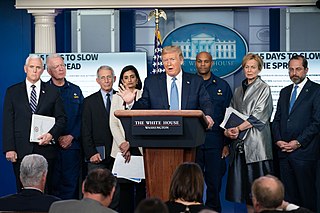
Hydroxychloroquine,sold under the brand name Plaquenil among others,is a medication used to prevent and treat malaria in areas where malaria remains sensitive to chloroquine. Other uses include treatment of rheumatoid arthritis,lupus,and porphyria cutanea tarda. It is taken by mouth,often in the form of hydroxychloroquine sulfate.

Alex Michael Azar II is an American attorney,businessman,lobbyist,and former pharmaceutical executive who served as the United States Secretary of Health and Human Services from 2018 to 2021. Azar was nominated to his post by President Donald Trump on November 13,2017,and confirmed by the United States Senate on January 24,2018. He was also chairman of the White House Coronavirus Task Force from its inception in January 2020 to February 2020,when he was replaced by Vice President Mike Pence.

The Association of American Physicians and Surgeons (AAPS) is a politically conservative non-profit association that promotes medical misinformation,such as HIV/AIDS denialism,the abortion-breast cancer hypothesis,vaccine and autism connections,and homosexuality reducing life expectancy. The association was founded in 1943 to oppose a government attempt to nationalize health care. The group has included notable members,including American Republican politicians Ron Paul,Rand Paul and Tom Price.

Regeneron Pharmaceuticals,Inc. is an American biotechnology company headquartered in Westchester County,New York. The company was founded in 1988. Originally focused on neurotrophic factors and their regenerative capabilities,giving rise to its name,the company then branched out into the study of both cytokine and tyrosine kinase receptors.

Eric Jeffrey Topol is an American cardiologist,scientist,and author. He is the founder and director of the Scripps Research Translational Institute,a professor of Molecular Medicine at The Scripps Research Institute,and a senior consultant at the Division of Cardiovascular Diseases at Scripps Clinic in La Jolla,California. He is editor-in-chief of Medscape and theheart.org. He has published three bestseller books on the future of medicine:The Creative Destruction of Medicine (2010),The Patient Will See You Now (2015),and Deep Medicine:How Artificial Intelligence Can Make Healthcare Human Again (2019). He was also commissioned by the UK 2018–2019 to lead planning for the National Health Service's future workforce,integrating genomics,digital medicine,and artificial intelligence.
An Emergency Use Authorization (EUA) in the United States is an authorization granted to the Food and Drug Administration (FDA) under sections of the Federal Food,Drug,and Cosmetic Act as added to and amended by various Acts of Congress,including by the Pandemic and All-Hazards Preparedness Reauthorization Act of 2013 (PAHPRA),as codified by 21 U.S.C. § 360bbb-3,to allow the use of a drug prior to approval. It does not constitute approval of the drug in the full statutory meaning of the term,but instead authorizes the FDA to facilitate availability of an unapproved product,or an unapproved use of an approved product,during a declared state of emergency from one of several agencies or of a "material threat" by the Secretary of Homeland Security.

Brett P. Giroir is an American pediatrician and a former four-star admiral in the U.S. Public Health Service Commissioned Corps. He currently serves on the board of directors for Remote Area Medical,and as the chief medical advisor for Gauss Surgical. He previously served as the 16th assistant secretary for health during the Trump administration from February 15,2018,to January 19,2021. He concurrently served as the secretary's principal public health and science adviser,the senior adviser for the Health Resources and Services Administration,the Centers for Disease Control and Prevention,and the Substance Abuse and Mental Health Services Administration as well as the senior adviser to the secretary for Opioid Policy. From 2020 to 2021,he served additionally as the director of the U.S. coronavirus diagnostic testing,and as the U.S. representative on the World Health Organization Executive Board. As COVID-19 testing czar,he was part of the White House Coronavirus Task Force.

Scott Gottlieb is an American physician and investor who served as the 23rd commissioner of the Food and Drug Administration (FDA) from 2017 until April 2019. He is presently a senior fellow at the conservative think tank the American Enterprise Institute (AEI),a partner at the venture capital firm New Enterprise Associates (NEA),a member of the board of directors of drug maker Pfizer,Inc,a member of the board of directors of Illumina,Inc.,a contributor to the cable financial news network CNBC,and a frequent guest on the CBS News program Face the Nation. An elected member of the National Academy of Medicine,Gottlieb is the author of The New York Times best selling book Uncontrolled Spread on the COVID-19 pandemic and the national security vulnerabilities that it revealed.

Sean Patrick Conley is an American physician and United States Navy officer who served as the Physician to the President from 2018 to 2021. Conley served as physician to president Donald Trump during the COVID-19 pandemic,often serving as the president's medical advisor,and treating the president when he tested positive for COVID-19.

The COVID-19 pandemic in the United States is a part of the worldwide pandemic of coronavirus disease 2019 (COVID-19) caused by severe acute respiratory syndrome coronavirus 2 (SARS-CoV-2). In the United States,it has resulted in 80,289,237 confirmed cases with 984,571 all-time deaths,the most of any country,and the nineteenth-highest per capita worldwide. The COVID-19 pandemic ranks first on the list of disasters in the United States by death toll;it was the third-leading cause of death in the U.S. in 2020,behind heart disease and cancer. From 2019 to 2020,U.S. life expectancy dropped by 3 years for Hispanic Americans,2.9 years for African Americans,and 1.2 years for white Americans. These effects have persisted as U.S. deaths due to COVID-19 in 2021 exceeded those in 2020.

COVID-19 drug development is the research process to develop preventative therapeutic prescription drugs that would alleviate the severity of coronavirus disease 2019 (COVID-19). From early 2020 through 2021,several hundred drug companies,biotechnology firms,university research groups,and health organizations were developing therapeutic candidates for COVID-19 disease in various stages of preclinical or clinical research,with 419 potential COVID-19 drugs in clinical trials,as of April 2021.

The Donald Trump administration communicated in various ways during the COVID-19 pandemic in the United States,including via social media,interviews,and press conferences with the White House Coronavirus Task Force. Opinion polling conducted in mid-April 2020 indicated that less than half of Americans trusted health information provided by Trump and that they were more inclined to trust local government officials,state government officials,the Centers for Disease Control and Prevention (CDC),and National Institute of Allergy and Infectious Diseases director Anthony Fauci.
There is no specific,effective treatment or cure for coronavirus disease 2019 (COVID‑19),the disease caused by the SARS-CoV-2 virus. One year into the pandemic,highly effective vaccines have now been introduced and are beginning to reduce mortality related to SARS-CoV-2;however,for those awaiting vaccination,as well as for the estimated millions of immunocompromised persons who are unlikely to respond robustly to vaccination,treatment remains important. Thus,the lack of progress developing effective treatments means that the cornerstone of management of COVID‑19 has been supportive care,which includes treatment to relieve symptoms,fluid therapy,oxygen support and prone positioning as needed,and medications or devices to support other affected vital organs.

Tatiana Michelle Prowell is an American medical oncologist specializing in breast cancer. She is an Associate Professor of Oncology at Johns Hopkins School of Medicine and Breast Cancer Scientific Liaison at the U.S. Food &Drug Administration.

During his term as president of the United States (2017–2021),Donald Trump and his administration repeatedly politicized science by pressuring or overriding health and science agencies to change their reporting and recommendations so as to conform to his policies and public comments. This was particularly true with regard to the COVID-19 pandemic in the United States,but also included suppressing research on climate change and weakening or eliminating environmental regulations.

Vladimir (Zev) Zelenko is a Ukrainian-American family physician and author known for promoting a three drug combination of hydroxychloroquine,zinc sulfate and azithromycin as part of an experimental outpatient treatment for COVID-19 that he has promoted as the Zelenko Protocol. He has also promoted unfounded medical advice,conspiracy theories,and misinformation about COVID-19 vaccination.

Misinformation related to the COVID-19 pandemic has been propagated by various public figures,including officials of the United States government. The Trump administration in particular made a large number of misleading statements about the pandemic. A Cornell University study found that former U.S. President Donald Trump was "likely the largest driver" of the COVID-19 misinformation infodemic in English-language media,downplaying the virus and promoting unapproved drugs. Others have also been accused of spreading misinformation,including U.S. Secretary of State Mike Pompeo,backing conspiracy theories regarding the origin of the virus,U.S. senators and New York City mayor Bill de Blasio,who downplayed the virus.

Chloroquine and hydroxychloroquine are anti-malarial medications also used against some auto-immune diseases. Chloroquine,along with hydroxychloroquine,was an early experimental treatment for COVID-19. Neither drug prevents SARS-CoV-2 infection.

The development of COVID-19 tests was a major public health priority during the early months of the COVID-19 pandemic.

The United States' response to the COVID-19 pandemic with consists of various measures by the medical community;the federal,state,and local governments;the military;and the private sector. The public response has been highly polarized,with partisan divides being observed and a number of concurrent protests and unrest complicating the response.

















